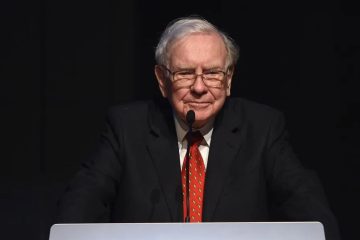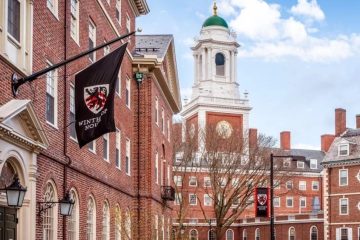For one of Europe’s Final Great Wall Street Players, it’s final moments

C.S. Venkatakrishnan was unintentionally promoted to the top position at British financial behemoth Barclays two years ago. He discovered a tumor on his neck and received a cancer diagnosis a year later.
After completing his treatment, Venkatakrishnan is now faced with an exam that could define his career. Persuading investors that Barclays’s unique blend of Wall Street heft and Main Street finance makes sense is the goal of the Indian-born risk specialist.
He’s getting ready to present his plan for the bank together with the annual report, which is due on February 20.
Following the resignation of then-CEO Jes Staley due to his connections to convicted sex offender Jeffrey Epstein, Venkatakrishnan, then 58, assumed the role of chief executive in November 2021.
The London shares of Barclays have since dropped by more than 25%. Numerous elite bankers left last year to work for other companies. Since the epidemic, customer balances at its renowned credit card division have dropped significantly, and Main Street banking in Britain is becoming more competitive, with JPMorgan Chase, Venkatakrishnan’s former employer, among others.
Of all non-US players, Barclays has one of the largest investment banks; it executes market deals and provides advice on mergers and initial public offerings.
Although Venkatakrishnan has attempted to downplay the likelihood of a significant reorganization, he has stated that he wishes to refocus the attention and acknowledged that the company’s low share price is an issue. He is investing over $750 million in the banking division of Tesco, a British grocery company, as a precursor to that emphasis.
In Davos, Switzerland, this month, Venkatakrishnan told The Wall Street Journal, “Our U.K. bank is at the core of Barclays.” “The core of our ambition is to be the best domestic bank in the world—something that any strong global bank must have.”
“I believe you need to have a more balanced bank if you’re going to aim for higher returns and a better valuation,” he stated.
Frequently addressed as Venkat, the cricket-aficionado financier divides his time between London and New York, making an effort to arrive at work by 6:30 a.m.
Having never managed a bank before, Venkatakrishnan had devoted a large portion of his professional life to risk management—a role that naturally values prudence. Some observers suggest he will now need to take decisive action.
Analysts, investors, and industry veterans suggest that possible actions may involve reducing the size of the investment bank or possibly divesting it. Additional choices include reducing expenses across the board for the bank and repurchasing more shares. Repurchases have the potential to increase share price and put Barclays in a better position to eventually acquire other companies.
There would probably be strong opposition to any significant reduction made to the investment bank.
They will have to make a few tough choices as a result. It is up to him,” stated Edward Firth, a Keefe, Bruyette & Woods financial expert.
“I think he’s a really good man,” Firth remarked. “Everyone knows someone who works at Barclays Investment Bank. There are plenty of huge heads and broad shoulders there, and you need a tough guy to take them on. And I’m not sure if Venkat has that or not.”
The challenges faced by Barclays are indicative of a wider restructuring of the global financial system and economy following the 2008–2009 financial crisis. Thanks to low interest rates and a growth in technology, American capital markets have expanded significantly, and the share prices of large US banks, including JPMorgan Chase, have skyrocketed.
But because of their weaker economies and stricter regulations, banks in the United Kingdom and continental Europe have generally fared much worse.
The market value of Barclays’ and many other European banks’ shares is far less than their book value, which is the excess of their assets over their liabilities. That implies that investors believe the banks will find it difficult to use the resources at their disposal to provide a respectable return for shareholders.
The once-largest bank in the world by assets, Royal Bank of Scotland, rebranded itself as the NatWest Group, a retail-focused bank. Following RBS’s bailout during the financial crisis, the UK government still owns a portion of it.
Barclays, on the other hand, eschewed a bailout in favor of continuing to be a major, multiservice bank operating across the Atlantic. It even strengthened its position on Wall Street by acquiring Lehman Brothers’ US division in a fire sale.
Former CEO of Barclays Robert Diamond claimed that British “ringfencing” regulations, which prevent inexpensive retail deposits from funding investment banking, put U.K. lenders at a competitive disadvantage against U.S. banks. He claimed that regulations increase the cost of capital and hinder banks’ ability to grow.
A prior attempted reinvention under Diamond’s successor, retail banker Antony Jenkins, highlights the difficulty facing Venkatakrishnan. Jenkins suggested significantly reducing the investment bank’s holdings in 2015. A person with knowledge of the situation said that the board first decided to proceed, but changed its mind in response to opposition from the leaders of the unit.
The bank’s performance infuriated the board, which eventually dismissed Jenkins. Upon becoming over, former JPMorgan banker Staley attempted to transform Barclays into a more manageable version of the US behemoth.
After joining Staley in 2016 as chief risk officer, Venkatakrishnan went on to lead the division in charge of international markets.
Early in the epidemic, Barclays’ investment bank had a boom thanks to its global markets division, which deals in derivatives, stocks, and fixed-income instruments. However, recent slowdowns in bond trading and dealmaking have resulted in a sharp decline in earnings.
The issues have been exacerbated by self-inflicted wounds, such as the sale of securities worth billions of dollars that were improperly registered in the United States and the acquisition of hazardous debt from Elon Musk’s buyout of Twitter.
Benjamin Toms, an analyst at Royal Bank of Canada, stated that the share price of the investment bank is being negatively impacted by its erratic results.
Barclays has lost ground in its own backyard in the meantime. According to RFI Global research, the percentage of British consumers who named Barclays as their preferred bank dropped from 16% in 2020 to 13% in 2023. Smaller companies’ comparable market share decreased from 20% to 17%. In terms of clients in both categories, Barclays continued to be the biggest bank in the United Kingdom.
A pandemic-related tendency has affected its other significant business, credit cards: Armed with cash, customers have paid down balances, lowering Barclays’s interest revenue.
Some players in the market are more upbeat. As indicated by return on tangible equity, the investment bank has gradually increased in profitability, according to Ambrose Faulks, a significant stakeholder in Barclays and head of London-based Artemis Investment Management. According to him, the department responsible for carrying out market transactions usually supplies a consistent flow of funds throughout recessions, helping the bank weather hard times.
According to Faulks, the investment bank is a stronger asset than most people realize.
Lucy Harlow
Lucy Harlow is a senior Correspondent who has been reporting about Equities, Commodities, Currencies, Bonds etc across the globe for last 10 years. She reports from New York and tracks daily movement of various indices across the Globe








